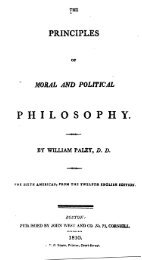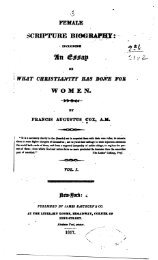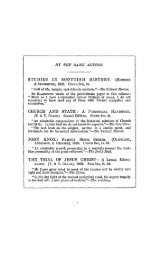BIBLE HISTORY - Classic Works of Apologetics
BIBLE HISTORY - Classic Works of Apologetics
BIBLE HISTORY - Classic Works of Apologetics
You also want an ePaper? Increase the reach of your titles
YUMPU automatically turns print PDFs into web optimized ePapers that Google loves.
CONDITIONS LEADING TO THE EXODUS.<br />
water <strong>of</strong> the Nile shall become hlQou as he<br />
pours it on the dry land. Here, Go(l seems to<br />
say, is a cause to which all the fruitful energies<br />
<strong>of</strong> the Nile are to be submissive. Surely, as<br />
Lange suggests, here are seen the prophetic,<br />
the priestly, and the kingly qualities <strong>of</strong> the<br />
deliverer. God gave these to him and developed<br />
these in him; anll, in their growth,<br />
Moses was less self-confident; he was modest<br />
in the presence <strong>of</strong> new energies.<br />
\Vhat coulcl be more natural to such a concen<br />
trated soul, in the midst <strong>of</strong> so much din and<br />
confusioll, than a desire to possess the orator's<br />
guerdon <strong>of</strong> strength? He bemoane(l the slowness<br />
<strong>of</strong> his tongue. Here was the Cromwell <strong>of</strong><br />
the period with what Sir Philip Warwick called<br />
a " sharp and un tuna hIe voice" and "no grace<br />
<strong>of</strong> speech." Like the stern Oliver, Moses was<br />
to change empires by saying "Yea" and<br />
" Nay," at the right times and with just emphasis,<br />
though he should also leave to the literature<br />
<strong>of</strong> eloquence some <strong>of</strong> its finest passages.<br />
No greater orator li,-es than he whose words,<br />
like his deeds, are God's utterances through<br />
him.<br />
It must be confessed that Pharaoh heard a<br />
trumpet-tone within the words which soon left<br />
the lips <strong>of</strong> Moses and fell upon the ruler's ears:<br />
"The God <strong>of</strong> the Hebrews hath met with us:<br />
and now let us go, we beseech thee, three days'<br />
journey into the wilderness, that we may sacrifice<br />
unto the Lord our God."l "The God <strong>of</strong><br />
THE war <strong>of</strong> the great exile was on. It was,<br />
as Pharaoh dimly saw, a war with Jehovah<br />
also. He had felt the force <strong>of</strong> the<br />
Hebrew's VISIOn <strong>of</strong> God. "Jehovah," said<br />
Moses, "God <strong>of</strong> Israel, saith: Let my people<br />
go that they may hold a feast in the wilderness."<br />
"'vVho is Jehovah?" protested the<br />
startled devotee <strong>of</strong> the golden bull - "\Vho is<br />
Jehovah that I should obey his voice?" 2 The<br />
King <strong>of</strong> Egypt had already lost his slaves.<br />
Statesmanship without the" I am that I am "<br />
has no future. It can only say to the strainecl<br />
institution, as Pharaoh said to that mass <strong>of</strong><br />
bondmen, "Get you to your burdens." All<br />
revolution is repressed evolution. "Statesmanship,"<br />
says Goldwin Smith, " is not the art<br />
<strong>of</strong> making a revolution, but the art <strong>of</strong> avoiding<br />
one." Moses seemed to be the revolutionist;<br />
he was only pleading for evolution. Pharaoh<br />
was the spring <strong>of</strong> the great revolt; and God<br />
said <strong>of</strong> him: "\Vith a strong hand shall he<br />
1 Exodus v, 3 (Revised Version). 2 Exodus v, 2.<br />
CHAPTER V.<br />
LAST DAVS IN EGVPT.<br />
the Hebrews!" This expression echoed the<br />
arms <strong>of</strong> ancient battles and whispered <strong>of</strong> other<br />
and future fields <strong>of</strong> contest. \Ve must remember<br />
that Moses was not always beyond reproach;<br />
God was delivering men by a man like unto<br />
themselves. But, at least, here was no shrewd<br />
diplomat seeking only the escape <strong>of</strong> Israel by<br />
way <strong>of</strong> false pretenses; the earnest-eyed Hebrew<br />
leader had not forgotten Israel's ancient rights;<br />
and, indeed, in this matter, he was regardful <strong>of</strong><br />
the rights and religious sensitiveness <strong>of</strong> Egypt.<br />
It must he remembered that Israel had never<br />
been captured, or rightfully bound, even according<br />
to Egyptian jurisprudence. Under Joseph,<br />
it was understood that they" sojourned there."<br />
Besides in this case, their worship, in which<br />
they were granted such privileges, must be an<br />
abominable thing to Egyptian piety. This request<br />
on the part <strong>of</strong> Moses and Israel gave the<br />
government <strong>of</strong> Pharaoh an opportunity for wise<br />
and just concession. "All government," says<br />
Burke, .. is possible only by compromise." A<br />
righteous compromise is truest statesmanship.<br />
\Vould he, could he, exercise the statesmanship<br />
which looked toward an assimilation <strong>of</strong> this<br />
people with the Egyptian-nationality? To neglect<br />
to do this involved, here and now, such an<br />
act <strong>of</strong> despotism as could indicate nothing else<br />
to Israel than a determination to abolish the<br />
worship <strong>of</strong> Jehovah ancl stamp out the Hebrew.<br />
Pharaoh refused. So, and only so, does God<br />
"harden Pharaoh's heart."<br />
drive them out <strong>of</strong> his land. I am Jehovah! "J<br />
Pilgrims with Mayflower compacts in their<br />
cabins owe to Pharaoh their glorious exile. "I<br />
am Jehovah!" They alone bear repuhlics and<br />
democracies into unsubdued wildernesses or<br />
lands <strong>of</strong> Canaan. "I am Jehovah!"<br />
Too much honor is not likely to be paid to<br />
the less conspicuous and unreconled forces in<br />
any beneficent revolution; and we are always<br />
likely to underestimate even so strong a spirit<br />
as Aaron, the elder brother <strong>of</strong> this diyinely led<br />
man. \Vhile Moses hacl heen in Midian, Aaron<br />
had been so sympathetic 'with God's purpose<br />
and so earnest in pushing it to achievement,<br />
that, at length, just before Moses returned to<br />
Egypt, Aaron journeyed to meet him at Sinai.<br />
In that forty years, Israel had grown ripe for<br />
revol t. The elclers hacl fostered and guided<br />
the growing desire for freedom. As they came<br />
to understancl God, they understood more truly<br />
man and his problem. With the development<br />
1 Exodus vi, I-2.





